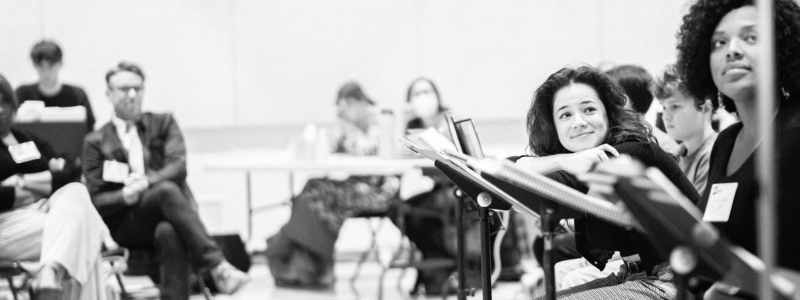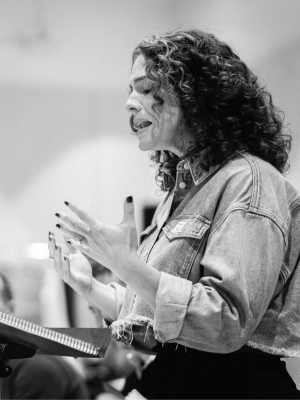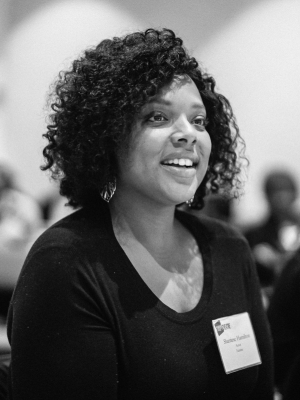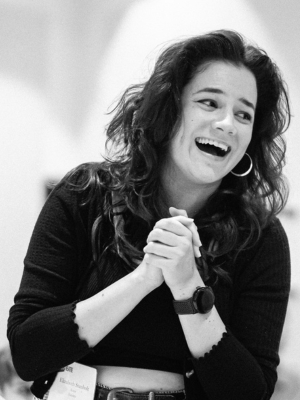Taking a Cue from the Lesbians, Dykes, and Shiksas of Falsettos

The first act of Falsettos is about the complex relationship between five Jews: a once-heterosexual couple and their son; a now gay male couple, where one partner has only recently come out and left his wife, and the other is his lover, a prolific and long-out gay man; and a heterosexual male doctor, who is everyone’s psychiatrist. On the surface, this act is about gay liberation and what it meant for men to have the freedom to desire and have sex with one another. Right below that surface, it is about how straight women and their children experienced gay liberation as both male sexual freedom and a rejection of the heterosexual nuclear family. Deeper still, it is about how gay liberation battled the homophobia rampant in the 20th century but did not take on how harmful patriarchy could be for gay men, women, and children. Not to put too sharp a point on it, but the opening number features four men exclaiming “BITCH” dozens of times, and a woman carrying a laundry basket.
The budding queer (an anachronistic term—“queer” would not be a reclaimed descriptor until well into the 90s) we meet in Act One is living in a world where gay male liberation and patriarchy are deeply intermingled. The “Tight-Knit Family” has a patriarch at its head: Marvin sings, “kid, wife, and lover, will have to admit, I was right. I cushioned the fall. I want it all.” The “all” for Marvin is to control all the other characters, his ex-wife, his son, and his lover. In “This Had Better Come to a Stop,” Marvin commands, “Whizzer’s supposed to always be here, making dinner, set to screw. That’s what pretty boys should do. Check their hairlines, make the dinner, and love me.” Trina responds from her point of view, “I chopped it and served his food. The asshole forced me…. And still the bastard divorced me.” The song ends with Trina and Whizzer addressing Marvin, “You’ve got a temper that redefines temper and – this had better come to an end!” They are the ones who have taken the brunt of the fall.

Trina, the only woman in Act One of Falsettos, responds to Marvin’s controlling behavior by alternating between an angry mess and an exhausted one, a mess made by Marvin’s patriarchal wrath. She sings, “I’m breaking down…. It’s me who is the matter, talking madder than the maddest hatter…I only want to love a man who can love me or like me or help me.” Three songs later, she is betrothed to her psychiatrist and teary-eyed that men are the problem: “I’m tired of all the happy men who rule the world…Happy, frightened men who rule the world. Stupid, charming men. Silly, childish jerks.” Why does Trina’s anger so quickly turn to self-loathing and defeat?
The tempo shifts when Marvin feels threatened by Trina being with another man and perceives Whizzer to be playing games with his heart. The song “Marvin Hits Trina,” is a turning point for this throuple. Marvin shouts, “Trina, how I despise your need for stupid conversation.” The song ends with Whizzer declaring he does not (cannot?) love Marvin, and Marvin smacking Trina. Who could love Marvin, with his demands for having it all at the expense of everyone around him?

Patriarchy meets its match in the second act, where Marvin, who has effectively alienated his entire family (biological and chosen), confronts an emerging, as yet unnamed, global pandemic and finds solace in a pair of lesbians living next door. Since AIDS is the subject of the brilliant dramaturgical note by Deborah Blumenthal, I will not write about the devastation that Falsettos, as a play, attempts to foretell or the 40+ years of history of AIDS. Nor about how HIV continues to hurt us all to this day, but I will say that Finn and Lapine were historically accurate to place women, especially lesbians, in the mix of what hospital care was like for some of the first gay white men to be dying from this unknown illness in 1981. The lesbians we meet in the opening song of Act Two—not “women with children,” as in Act One, but “spikey lesbians, women internists,” and “shiksa caterers” —are the feminist heroes of the play. They offer the true antidote to patriarchy. They are also the only gentiles, the only Black person, and the people (save Mendel) who do not make their romantic lives with men. They are feminists who take care of everyone. Dr. Charlotte belts out to her lover, Cordelia, “Do you know how great my life is?…Saving lives and loving you.”

It is in a pair of songs that feature the lesbians—both in conversation with one another, and singing in unison—that I hear feminist anthems. In “Something Bad is Happening Here,” Dr. Charlotte names that people dismiss her as a dyke and also a bitch: “People might think I’m very dykish. I make a big stink when I must—but goddamn; I’m just professional … If I’m a bitch—well, I am what I am. Just call me doc. Don’t call me lady…Bachelors arrive sick and frightened…Something bad is happening.” Dr. Charlotte is the only person in Falsettos to come close to naming what we would very soon know as AIDS. Then Cordelia displays her love and care for her lover. She sings “She’s my doctor, and I love her. She’s got passion. She’s intelligent…and I love her.” These lesbians, dykes, and shiksas model for every other character what love can look like: it is not having it all, it is caring about them all.
The most surprising and redemptive song for me is “Unlikely Lovers.” Sung by the gay and lesbian couples toward the end of the second act, it portrays a kind of feminist hope for the characters of Falsettoland. Marvin whispers, “I can’t help but feeling I’ve failed. Let’s be scared together. Let’s pretend that nothing is awful.” He and Whizzer embrace in the hospital bed and declare to one another, “I love you.” When Dr. Charlotte and Cordelia appear, they become four unlikely lovers, singing in harmony. Four queer lovers, who have a glimpse at survival but only because they sing in unison.
JENNIFER BRIER, PhD, is a professor in Gender and Women’s Studies and History at the University of Illinois Chicago. Her research and teaching are largely focused on exploring the historical intersections of gender, race, and sexuality. Her first book, Infectious Ideas: U.S. Political Response to the AIDS Crisis (University of North Carolina Press, 2009) argues that AIDS provides the perfect lens through which to see the complex social and political history of the 1980s and 1990s. Brier is also a public historian of LGBTQ History and HIV/AIDS. She co-curated the award-winning exhibition, “Out in Chicago,” on LGBT history in Chicago at the Chicago History Museum, Surviving and Thriving: AIDS, Politics and Culture, a traveling exhibition for the National Library of Medicine, and I’m Still Surviving, a living women’s history of HIV/AIDS, www.stillsurviving.net.